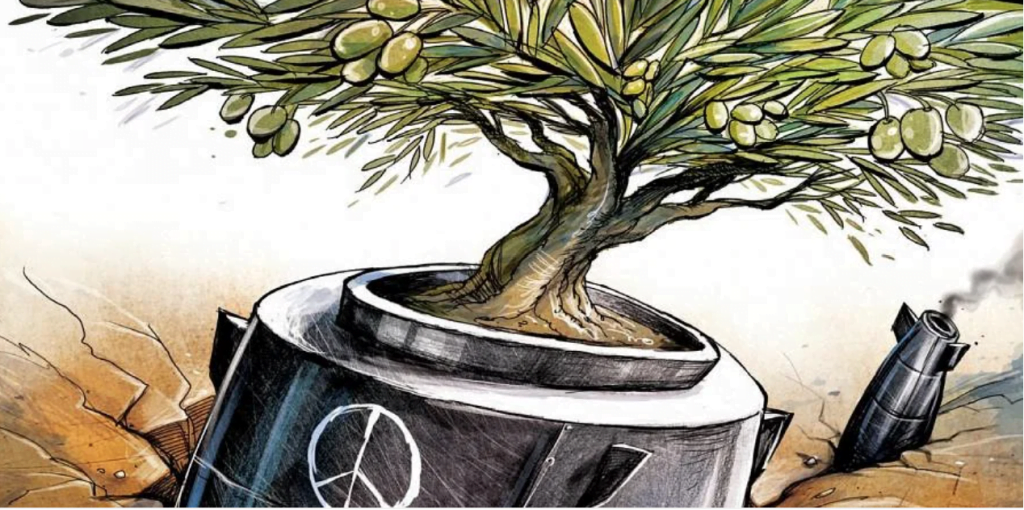- 7 December، 2023
- Posted by:
- Category: Uncategorized

Whether Netanyahu knew about the Palestinian resistance’s plan to launch a substantial operation inside the 1948-occupied territories—now Israel—and allowed it to happen for self-serving calculations of political survival is negligible in the broader scheme of the confrontation between Israel as an occupying power and the Palestinians as an occupied, oppressed people since the Nakba of 1948.
It won’t also make much difference whether during its genocidal war against the Palestinian people in the Gaza Strip, the occupying forces will be assassinating or capturing key resistance leaders from Hamas, Islamic Jihad, Popular Front for the Liberation of Palestine or the Aqsa brigades. For as long as the Palestinians are subject to genocide, oppression, ethnic cleansing and apartheid, the spirit of resistance will persist for generations to come. This phenomenon is believed to have been absorbed by all the involved parties over the last two months.
Many would argue that whatever will be dealt with in 2024 will be all too familiar to what has been discussed at least since the UN Security Council resolution 242 of 1967 following Israel’s occupation of eastern Palestine. Despite its crime against the Palestinian People, the 2023 Gaza genocide can and should only be seen as a big step towards some sort of Palestinian freedom, independence and peaceful solution.
After the ceasefire, there will be an additional evaluation of the results on the ground. Several issues at the local, national, regional and international levels will resurface. The issue of Palestinian division—Fatah in Ramallah vs Hamas in Gaza—will be discussed. It is highly likely that one positive outcome of the Gaza genocide will be the end of the 16-year-long internal division, with one authority ruling both regions. This is directly linked to holding parliamentary and presidential elections in the occupied territories—with or without the full and internationally recognised establishment of a Palestinian state.
Since an apartheid state is not a solution, a great deal of debate in the last three decades has focused on the format of the solution: one state (for both peoples), two states or a confederation.
The two-state solution, with a Palestinian state only on 22 per cent of historical Palestine, is being opposed by the growing population of Jewish settlers, which is nearing one million in the occupied West Bank and East Jerusalem. They are also not for the territorial linking of Gaza with the closest part of the West Bank, that is Al-Khalil or Hebron.
Despite the understandable negative debate about the viability of a two-state solution, work towards it supersedes any work done on any other solution. It has received verbal acceptance at the UN and from most of the international community.
From our longitudinal observation of the occupation of Palestine since the 1948 Nakba, we strongly believe that it would be too abominable for both sides to face such losses and traumas yet again. Hence, a ray of hope is seen for a peaceful outcome.
During such a crisis, those who can maintain a sanitised, cold-headed discussion will be thinking of the much loved ‘window of opportunity’ formula. The challenge is in rejecting the Israeli occupation—which, since an extremist Jewish criminal assassinated the then peacemaker Yitzhak Rabin in November 1995—has been led from one extreme to the horrendous current one by Benjamin Netanyahu.
In order to raise expectations for a peaceful solution, Israel ought to abandon its criminal tactics of the annihilation of Palestinians, which is now being openly expressed as a zero-sum game where Israelis wish to exterminate and expel as many Palestinians as possible.
After this war, only a win-win situation can be accepted in order to reach a calm and bloodless period, at least at this stage and until the 106-year-old conflict—which started with the Balfour Declaration on November 2, 1917—is satisfactorily resolved. There is a need for imagination, creativity and courage not to remain imprisoned by bloodshed and grief.
Not only does Palestinian independence have to integrate physical reconstruction as well as psychological rehabilitation, it also needs to include economic development for the nation-building process.
It is no secret that Netanyahu wouldn’t have committed such a genocidal crime had he not received political cover and financial support from the US and its closest European allies. All these political actors are complicit with the crime. Now that global public opinion has robustly shifted towards the plight and rights of the Palestinian people, these supporters of the Israeli occupation should have the foresight to curb the aspiration for a ‘Greater Biblical Israel’. They ought to be able to exercise pressure to make the Israeli leadership abandon its existing—in theory and practice—expansionist plans.
Regionally, even the Arab regimes who accepted the occupation and signed the Abraham Accords to establish diplomatic and economic ties will most probably see that serving their own economic interests while ignoring Palestinian rights is both risky and unwise in the long run. The October 7 operation aimed to curb Saudi Arabia’s normalisation with Israel.
The tendency of not abandoning Netanyahu’s deceptive formula of ‘Peace for peace’ for ‘Land for peace’, which was suggested in the Arab peace plan of 2002, will broaden the spirit of Jabhat al-Muqawamah, or resistance front, in the Arab world and will harm the Gulf’s economic interests and future projects. With a positive shift in the Iranian-Saudi relations brokered by China, warmer relations with Moscow, and expansion of BRICS, it is highly likely that the penny will drop after the Gaza war. Achieving détente would also necessitate the resurrection of the Quartet— European Union, Russia, UN and the US—established in 2002, which would mean direct involvement with Russia.
One big player missing thus far has been India, which as a formerly colonised state should make a comeback in the spirit of Bandung, because wise and elderly states and figures always argue that a peace process is preferable to war. India can certainly add weight to a peaceful resolution based on its decolonisation heritage. If peace is not the preferred track, then a regional war with some spillovers will be inevitable.
Makram Khoury-Machool
Founding Director, Cambridge Centre for Palestine Studies and European Centre for the Study of Extremism, UK.
